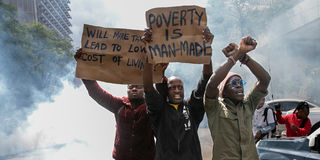Tear gas, arrests at Kenya protest over tax hike plans

Kenyan activists shout amidst teargas during a protest over tax hike plans in Nairobi on June 6, 2023. Kenyan police fired tear gas and arrested 11 protesters during a march in Nairobi on Tuesday against a new finance bill that critics say will pile more economic hardship on ordinary people. PHOTO | AFP
What you need to know:
- The proposed legislation calls for new or increased taxes on a wide range of items including fuel and food as well as beauty products, crypto currencies and social media influencers
Nairobi. Kenyan police fired tear gas and arrested 11 protesters, AFP journalists said, during a march in Nairobi on Tuesday against a new finance bill that critics say will pile more economic hardship on ordinary people.
The proposed legislation calls for new or increased taxes on a wide range of items including fuel and food as well as beauty products, crypto currencies and social media influencers.
Police fired several volleys of tear gas and arrested 11 people, bundling them into a police truck, to try to disperse the demonstration, AFP journalists at the scene said.
"Down down finance bill," chanted protesters as a group of about 100 marched towards parliament, which resumed on Tuesday after a recess and is expected to debate the legislation this week.
"They want to kill us with hunger."
The demonstrations -- which the organisers said had been notified to the police -- have been dubbed "sita sita" (six six) as they were held on the sixth day of the sixth month.
Marchers waved placards reading "Will more taxation lead to low cost of living" and "Poverty is man-made".
"We are witnessing some chaos which is not right. We are being chased but we are fighting for our rights," said one of the protesters, Rodgers Obogi, a 23-year-old unemployed man.
"We are demonstrating to express our frustrations, people need money, that money is being taxed twice."
Amnesty Kenya called for the unconditional release of the 11 arrested, saying the right to protest, "express oneself, and participate in public discourse is sacred under our Constitution and international law".
Kenyan activist Boniface Mwangi denounced the arrests, writing on Twitter that "sending police to arrest peaceful protesters for exercising their right to be heard is dictatorial behaviour".
The intervention also drew rare public criticism from a senior civil servant.
"No peaceful protest, particularly one focused on an ongoing national economic conversation, should be disrupted nor should any arrests be carried out," said Korir Sing'oei, principal secretary at the foreign ministry.
'Cash crunch'
President William Ruto is seeking to fill the government's depleted coffers and repair a heavily-indebted economy inherited from his predecessor Uhuru Kenyatta, who splurged on major infrastructure projects.
His government has drawn up a 3.6-trillion shilling ($26.2-billion) budget for 2023/24 with the proposed new taxes expected to generate 289 billion shillings.
Critics accuse Ruto of rowing back on promises made during the August 2022 election campaign, when he declared himself the champion of impoverished Kenyans and pledged to improve their economic fortunes.
Opposition leader Raila Odinga's Azimio party has denounced the bill, saying Ruto's government wanted to "take billions from the pockets of some of the poorest people in this country while expecting them to cheer".
"We have refused to sit back and watch as Kenyans are being harassed to fix cash crunch caused by economic mismanagement, wasteful spending, corruption and skewed and incompetent hiring into critical public positions," Azimio said in a statement on May 30.
Odinga earlier this year led a series of protests over Kenya's cost-of-living crisis and his complaint that victory was stolen from him in the presidential election.
Amnesty International and Human Rights Watch said in a report last week that 12 people had been killed by police during the demonstrations in March.
According to government figures, three people were killed in the unrest, including a policeman.





